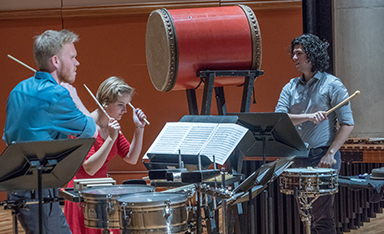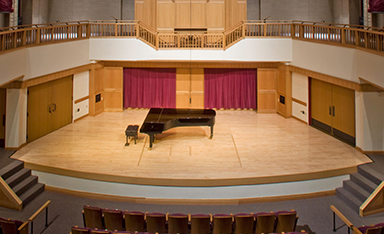Robert Wolff Alumni Profile
by Robert Wolff
Photo: Andrea Shea, WBUR/Boston. A playback session for Shostakovich: Symphony #8, Symphony Hall, Boston, March 2016. (L to R) Boston Symphony Orchestra Maestro Andris Nelsons and Robert Wolff.
When contacted to write an update to a previous profile, my first thought was, “So soon?” I was amazed that seven years had elapsed; in some ways the years had flown by, and in others it seemed a lifetime past.
I have been busy since the adventure of Lincoln. I still watch the Oscars yearly, since if John Williams writes a score, it usually gets nominated. I’ve worked on the Williams film scores to The Book Thief, Star Wars Episodes VII, VIII, and IX, The BFG, Dear Basketball, The Post, themes for Solo: A Star Wars Story and Gustavo Dudamel’s score to Libertador. I’ve worked on various album projects, including Hooten Plays Williams, the third disc of the “Williams/Spielberg Ultimate Collection,” and Anne-Sophie Mutter and John Williams’s Across the Stars.
A newer addition to my portfolio is editing for Andris Nelsons and the Boston Symphony Orchestra. I was asked to edit his inaugural concert recording as well as the PBS-TV production in 2015. Over the past five years we have worked on a complete cycle of Shostakovich symphonies, earning Grammy awards for Symphony No. 10 and the set of Symphonies 5, 8 and 9. Eight symphonies have been released, five more are in various stages of completion while two remain to be recorded. A set of Brahms symphonies was also recorded and readied for release in the span of six weeks in 2015. There is also a cycle of Strauss tone poems in progress and possibly a cycle of Mahler symphonies in the works.
Of course, in March 2020, the novel coronavirus brought everything to a screeching halt. I’ve been idle for 23 weeks as of mid-August. Over the past few weeks a few orchestras have slowly gone back to work in Europe and Asia, and there have been a few orchestra sessions here in Los Angeles. Many major orchestras have cancelled their fall concerts and the hope of resuming sometime early in 2021 dims with each passing day. The sessions here have been conducted under extremely tight protocols, limiting the number of musicians in the studio and in the control room to much smaller numbers than before the pandemic. The distancing required is an engineering challenge, requiring a change in thinking about mic placement and techniques. Since the majority of my work requires a lot of people in one place, the future is cloudy at best. Despite today’s dour environment, I still hold on to hope that we may one day make music as before.
The challenges facing today’s Lamont students are daunting. I humbly offer a few lessons I learned along the way:
1. Whatever your involvement with music is, remember that it is first and foremost an entertainment. It is a way of telling stories and connecting with others. Whatever you do, whether it be a project over Zoom or playing in a great concert hall, whether it be recording orchestras or jazz bands, whether or not the music you make is to your personal taste, remember it’s to be enjoyed. Many of the most beloved performances were made by people who were trying to entertain themselves.
2. Be patient and don’t say no to work or feel like something is beneath you. I didn’t leave Lamont and start working with world-class artists immediately—it took me 15 years of hard work before collaborating with “big-time” folks. I’ve done some crazy sessions but I didn’t really say “no” until I was asked to record an opera-singing dog after 32 years as an engineer. I also made the mistake of pooh-poohing MIDI because people were using it to imitate orchestras. Once I was in the film music business, I regretted that stance. I have also dabbled with a lot of other things: arranging, conducting, copying, trucking, radio, etc. The more things you know how to do, the better off you’ll be, and you’ll discover things about yourself that you didn’t realize before.
3. It’s never too early to be a professional. This was one of the first lessons I learned at Lamont. I was a freshman in the top ensembles and had to measure up to upperclassmen and graduate students. People will assume you know what you are doing. They will be more impressed with your talents if you do the little things like showing up on time, being prepared and getting along with the people you’re working with. Most people who possess tremendous talent are also pleasant to be around. Everyone wants and deserves to be treated with respect and humanity. The most famous person you know puts their pants on one leg at a time, same as you. Even Steven Spielberg drives his kids’ carpool..


